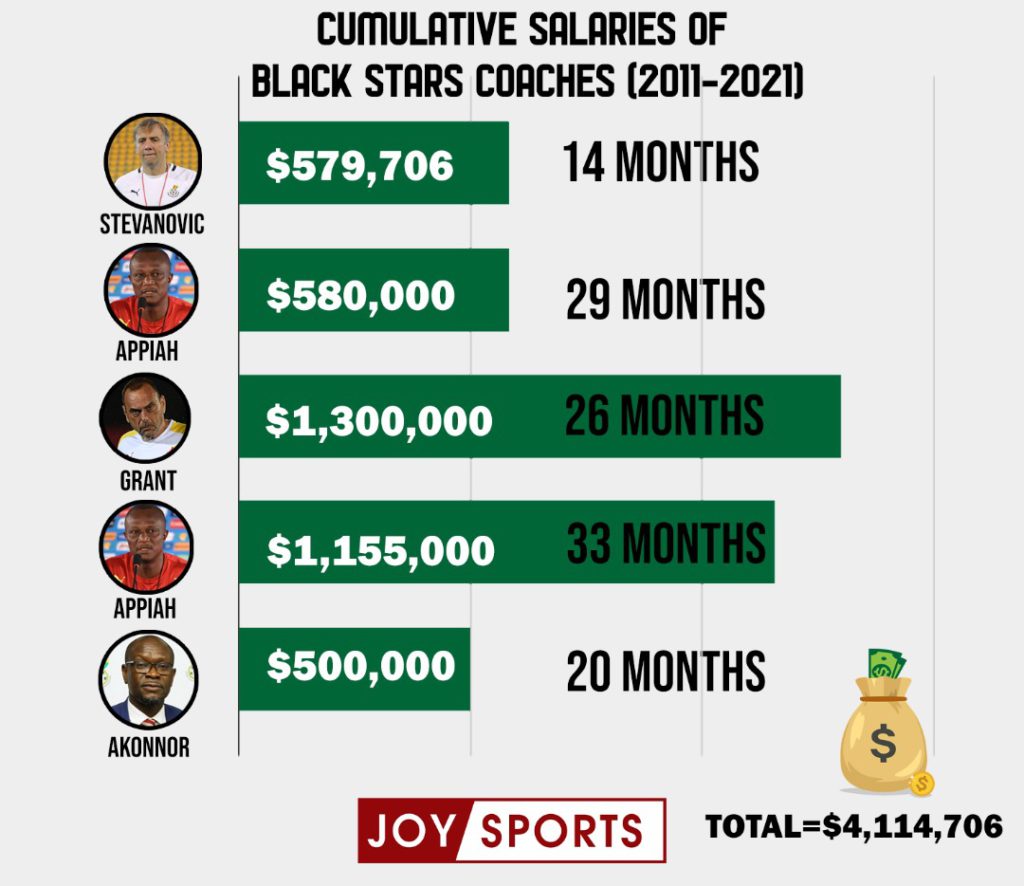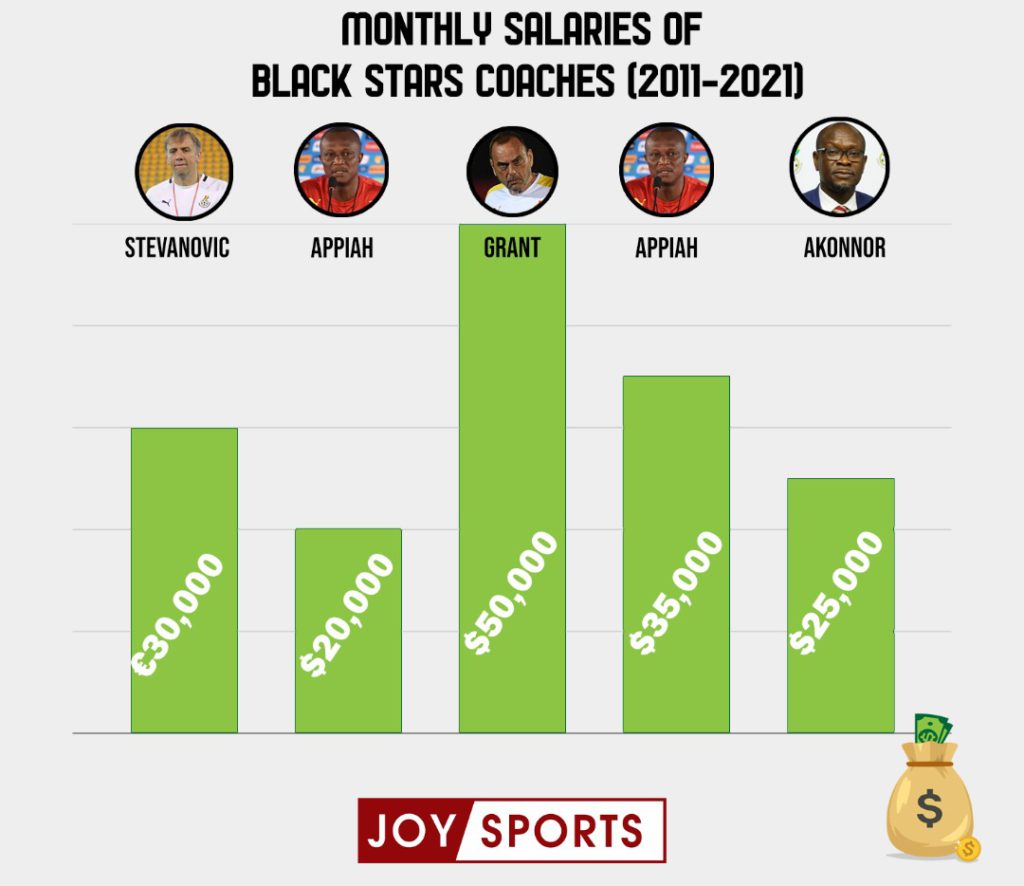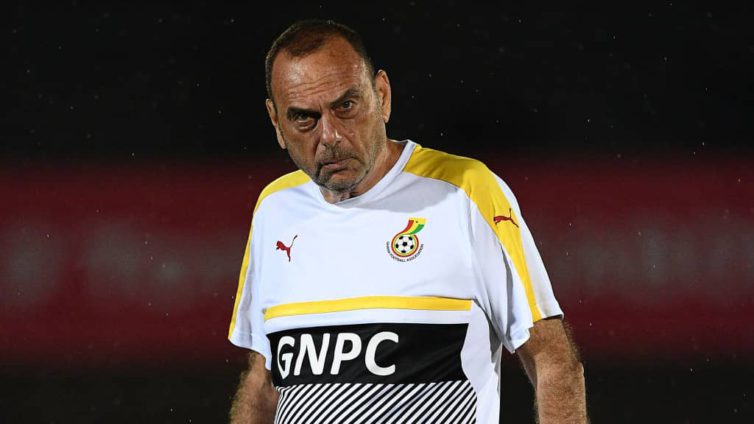Since CK Akonnor’s unsurprising sacking earlier in September, the Ghana Football Association has searched for a successor and have finally made a choice.
In recent days, Milovan Rajevac has been the name on the lips on many Ghanaians with his second coming confirmed. The nation is set to cough up a reported $30,000 monthly for his services.
The Serbian bowed out after the nation’s historical feat in the 2010 FIFA World Cup and some can argue that it has been downhill from there with huge sums spent on coaches.
Joy Sports financial journalist Bill Eshun takes a deeper look at the finances involved with Black Stars coaches after Rajevac.
Coaches
Out went Rajevac, in came Goran Stevanovic, another Serbian in 2011. The former Partizan coach took over in January 2011 and took his leave after 14 months in charge. He also guided the team in its failed 2012 Africa Cup of Nations run.
The nation then turned to a local coach; James Kwesi Appiah that year. The former Asante Kotoko manager led the side during the 2013 AFCON and 2014 FIFA World Cup. The 61-year-old left by mutual consent after the World Cup which was filled with controversy.
Avram Grant stepped in shortly afterwards, leading the country in its 2015 AFCON bid. The former Chelsea boss was also there for part of Ghana’s 2018 World Cup qualifying campaign. He left in February 2017.
James Kwesi Appiah returned to the helm that year and spearheaded the nation to the 2019 edition of the AFCON. He was officially shown the door in January 2020 and was replaced by Charles Akonnor who oversaw Ghana’s 2021 AFCON qualifying campaign and part of the 2022 World cup qualifiers.
Four coaches managed the team in the last 11 years with one serving two terms.
Money spent since Milo

In total, $4.1 million was paid for the services of four Black Stars coaches in the last 10 years. This means that the average spend on each coach is $1.03 million.
Kwesi Appiah earned $1,735,000 over his two stints, the highest figure among the coaches hired. In his first stint, he earned $580,000 and took home $1,155,000 in his second stint.
Avram Grant earned the highest in one stint, taking home $1,300,000 from his 26-month spell in charge.
Goran Stevanovic pocketed $579,706 in 14 months and CK Akonnor, who earned the least among the four, took home $500,000 in a 20-month period.

On a monthly basis, Avram Grant commanded the highest monthly fee; $50,000. It may have boiled down to his experience at Chelsea where he led the Blues to the 2008 Champions League final as a caretaker manager.
Kwesi Appiah commanded the least monthly figure his first stint, pocketing $20,000 per month from 2012 to 2014. Stevanovic was the only one among the list who took his salary in euros, commanding 30,000 monthly for 14 months.
The figures, of course, do not include performance related bonuses which mean head coaches received more money during their stints with the senior national team.
Impact of coaches
Grant, arguably, achieved the biggest feat among the four managers. The Israeli tactician managed to repeat one of Rajevac’s major achievements; reach the final of the AFCON.
In 2010, under coach Milo as he is affectionately called by Ghanaians, the Black Stars reached the final in Angola with a compact defense and laser precise finishing. The team was stopped in its tracks by eventual champions Egypt.
Under Grant in 2015, Gyan and co reached the final of the continental showcase but were heartbroken by Ivory Coast in a penalty shootout.
Kwesi Appiah led the team to the 2014 World Cup in his first stint, a commendable effort although the team were a shadow of the 2010 version performance wise. He also led the nation to fourth in the 2013 AFCON, a repeat of Stevanovic’s record with the side a year earlier.
In his second stint, Appiah was unable to lead Ghana past the round of 16 in the 2019 AFCON. It was Ghana’s worst finish in the competition since 2006 (knocked out of group stage).
CK Akonnor only had the opportunity to fully oversee Ghana’s qualification to the 2021 AFCON. He was initially expected to lead the nation to the main tournament.
It can clearly be seen that none of the coaches were able to win any major trophy in the last 10 years which is, without doubt, disappointing.
Expectation
If the Serbian actually takes the job, he will be under even more pressure considering his past achievements in 2010.
Ghanaians have over the years expected to see AFCON title return to the nation since the team last won it in 1982. But, most of all, an identity has to be seen in how the team plays.
Any coach who manages the Black Stars has a herculean task on his hands. But, then again, that is why the tactician is hired in the first place.
Latest Stories
-
DAMC, Free Food Company, to distribute 10,000 packs of food to street kids
32 minutes -
Kwame Boafo Akuffo: Court ruling on re-collation flawed
52 minutes -
Samuel Yaw Adusei: The strategist behind NDC’s electoral security in Ashanti region
54 minutes -
I’m confident posterity will judge my performance well – Akufo-Addo
1 hour -
Syria’s minorities seek security as country charts new future
2 hours -
Prof. Nana Aba Appiah Amfo re-appointed as Vice-Chancellor of the University of Ghana
2 hours -
German police probe market attack security and warnings
2 hours -
Grief and anger in Magdeburg after Christmas market attack
2 hours -
Baltasar Coin becomes first Ghanaian meme coin to hit DEX Screener at $100K market cap
3 hours -
EC blames re-collation of disputed results on widespread lawlessness by party supporters
3 hours -
Top 20 Ghanaian songs released in 2024
3 hours -
Beating Messi’s Inter Miami to MLS Cup feels amazing – Joseph Paintsil
4 hours -
NDC administration will reverse all ‘last-minute’ gov’t employee promotions – Asiedu Nketiah
4 hours -
Kudus sights ‘authority and kingship’ for elephant stool celebration
4 hours -
We’ll embrace cutting-edge technologies to address emerging healthcare needs – Prof. Antwi-Kusi
4 hours

